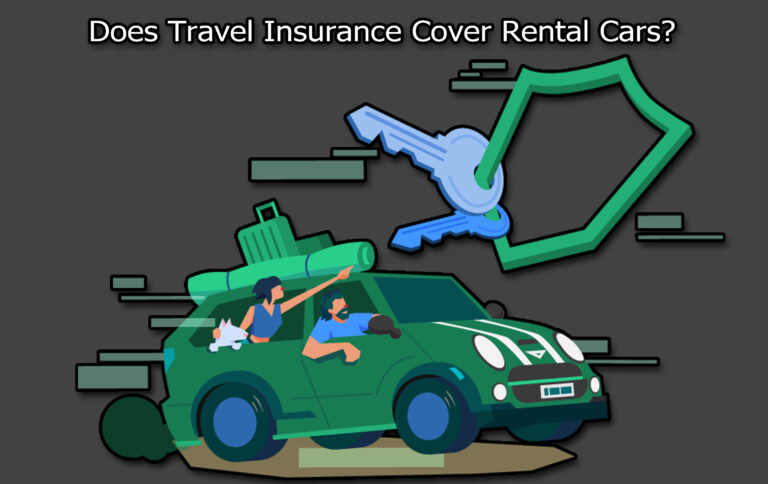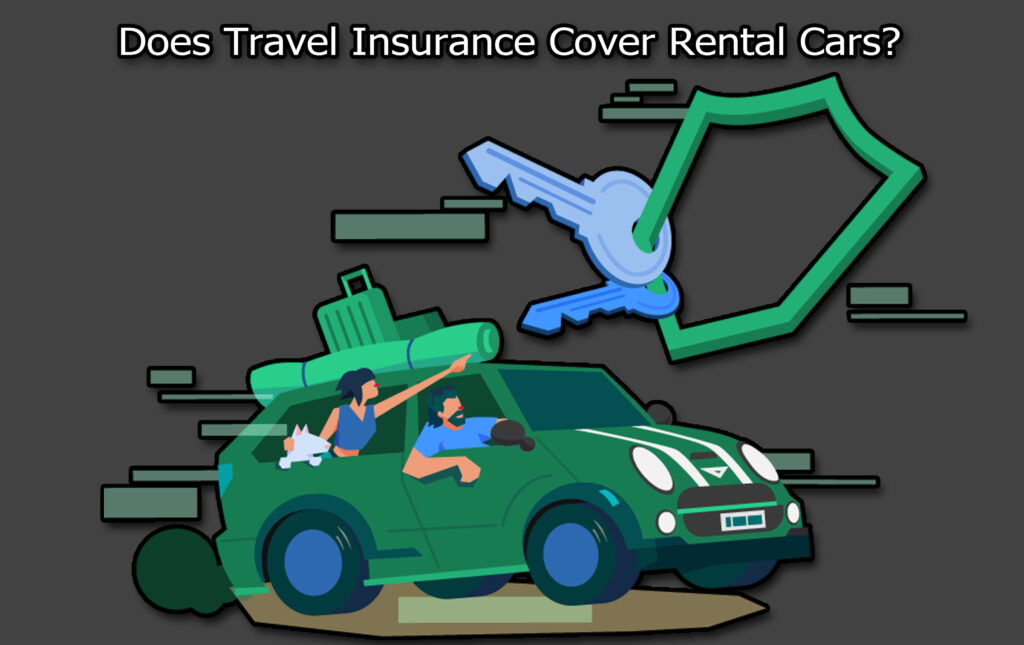
Does Travel Insurance Cover Rental Cars? Traveling can be really be an exciting experience but it can also be completely unpredictable. Whether you’re taking a road trip or driving through a new city, rental cars offer the convenience of flexibility and freedom.

However, this freedom comes with its own share of responsibility and the preparedness for potential for accidents, theft, or damage. This is where the insurance coverage comes into play.
While most travelers understand the importance of having travel insurance, many are unsure if it covers rental cars. Asking this crucial question will prevent disaster from relying solely on your regular insurance or the rental company’s policy.
What’s more, this might leave you exposed to financial risks.
Travel insurance is typically purchased to protect against unexpected travel disruptions such as trip cancellations, medical emergencies, and lost luggage.
But when it comes to rental cars, the coverage landscape becomes a bit more complex. Some travel insurance policies include rental car coverage, while others may require add-ons.
What is Rental Car Coverage in Travel Insurance?
Also known as Rental Car Damage Coverage or Collision Damage Waiver, the Rental car coverage is a specific benefit that may be included in some travel insurance plans or offered as an optional upgrade.
Also, this type of coverage is designed to reimburse you for costs related to damage or theft of a rental car during your trip.
In hindsight, if your rental car is damaged in a collision, vandalized, or stolen while you’re using it, rental car coverage can help cover the repair or replacement costs.
It usually substitutes for the coverage offered by the rental company, which can be costly if purchased directly at the counter. However, the coverage comes conditions, limitations, and exclusions that’s crucial to understand.
Features Of Rental Car Insurance
Here are the key features included in the coverage:
- Coverage for physical damage to the rental vehicle
- Coverage for theft or vandalism
- Reimbursement for towing expenses
- Payment of loss-of-use fees charged by the rental agency
What It Does Not Cover:
- Liability for injury to other people or damage to other vehicles
- Mechanical breakdowns
- High-risk vehicles like luxury or exotic cars
- Unauthorized drivers or driving under the influence
How Can You Get Rental Car Coverage with Travel Insurance?
Not all travel insurance policies actually include rental car protection, so it’s important to know how you can get this type of coverage when planning your trip. There are three main ways they are included and they are:
Comprehensive Plans
Some travel insurance policies automatically include rental car damage coverage as part of a comprehensive package. However, this inclusion varies by provider and plan. You’ll need to check the policy details to confirm if it’s included and what the coverage limits are.
Credit Card Coverage
Some premium credit cards provide rental car insurance as a benefit when you use the card to pay for the rental and decline the rental company’s CDW.
However, coverage differs by card provider, and credit card insurance may be secondary, meaning it only kicks in after your personal auto insurance has paid out.
Optional Add-On or Upgrade
Many insurers offer rental car coverage as an optional benefit that you can add to your policy for an additional fee. This can be a smart move if you know you’ll be renting a car, as it is often more affordable and offers better value than buying CDW at the rental counter.
What Are the Limitations and Exclusions?
Despite the fact that your travel insurance includes rental car coverage, there are still specific limitations and exclusions that could affect your eligibility to claim. Let’s look at some common exclusion that’s included:
- Unauthorized Use: If someone is not listed on the rental agreement drives the vehicle, then the coverage may be voided.
- Certain Locations or Countries: Some insurance providers may exclude coverage in high-risk or sanctioned countries.
- Types of Vehicles: Exotic cars, motor homes, motorcycles, or trucks are typically not covered under standard rental car policies.
- Illegal Activity or Recklessness: Driving under the influence, racing, or off-road use often disqualifies you from coverage.
- Duration of Rental: Coverage may be limited to rentals of 30 days or less.
Before you travel, it’s important you read the words of the policy carefully. Furthermore, you must pay attention to coverage limits, deductibles, and the documentation you’ll need if you file a claim.
Should You Rely Solely on Travel Insurance?
While travel insurance with rental car coverage can be incredibly helpful, it may not be sufficient in all situations. You’ll need to assess your needs and consider adding travel insurance with other sources of protection for comprehensive coverage. Here are some additional tips you can check out:
- Compare travel insurance policies to find one that includes robust rental car coverage.
- If using a credit card benefit, verify the coverage details beforehand and make sure to follow all requirements.
- Don’t forget about liability coverage, which travel insurance often doesn’t cover. What’s more, you may need to purchase this from the rental agency or your personal auto insurer.
Being over-insured might cost a bit more upfront, but being underinsured could cost you significantly in the event of an accident or theft.
Frequently Asked Questions
Does Travel Insurance Cover Liability For Rental Cars?
No, most travel insurance policies do not cover liability. That means if you cause injury to another person or damage another car, you will need separate liability coverage. This is sometimes provided by the rental agency or through your own auto insurance.
Will Travel Insurance Cover Flat Tires or Engine Issues In a Rental Car?
Actually, it doesn’t. Travel insurance covers damage from collisions, theft, or vandalism. Hence, mechanical breakdowns or maintenance issues like flat tires or battery problems are excluded.
Does Travel Insurance Rental Car Coverage Apply Worldwide?
Coverage actually varies by insurer. Some policies exclude high-risk destinations or countries under sanctions. Additionally, you must always review the covered territories in your plan.